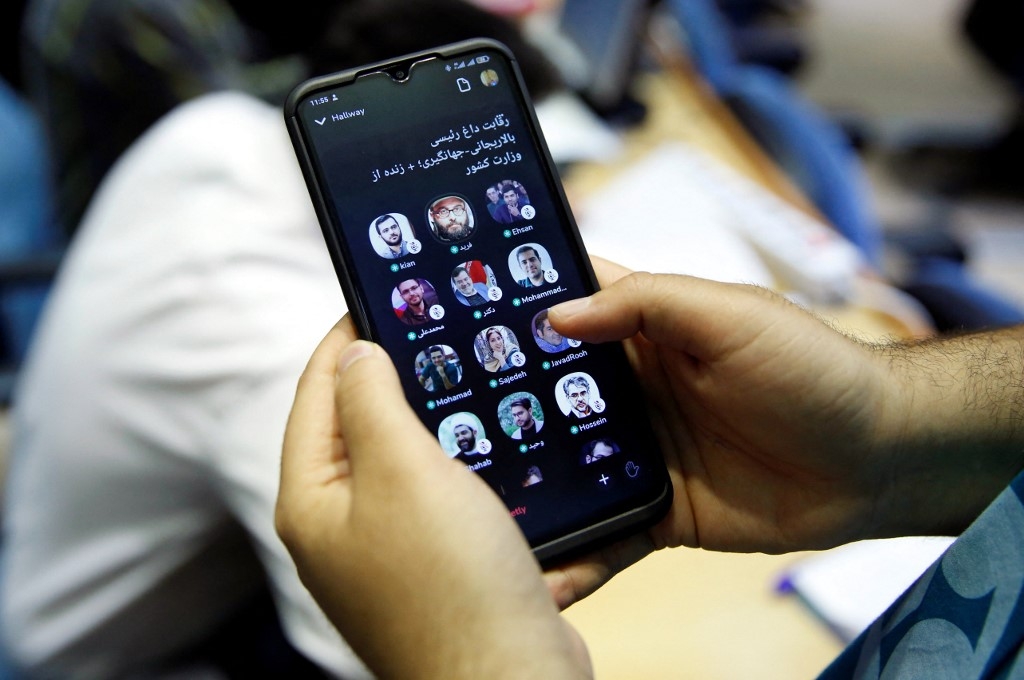Iran: Restrictive internet bill threatens Instagram money makers

A bill that would further limit internet freedom in Iran - and hand control to the armed forces - is panicking Iranians who have overcome sanctions and a pandemic to make money online.
The proposed legislation, backed by hardliners and set in motion just before the election of newly inaugurated President Ebrahim Raisi, has yet to be passed. But its recent discussion in parliament alone reportedly sent Iranian internet users flying to Google “migration”.
The internet is already a highly restricted space in Iran. Along with thousands of websites, YouTube, Facebook, Twitter and Telegram are officially blocked, though widely accessed via virtual private networks (VPN).
In November 2019, during massive anti-government protests in which security forces killed hundreds of people, internet access was almost entirely shut down.
The proposed bill would require foreign social media companies to comply with the government’s rules, including having a local company representative, removing “inappropriate content” within 12 hours, and validating and storing the data of all users in Iran. If the companies don’t comply, they will be blocked or have their bandwidth severely limited. Iranians who use banned services could pay fines or even go to jail. Most significantly, control of Iran’s global internet connection would move from a civilian working group to the armed forces.
On 28 July, a majority of MPs in the conservative-controlled parliament voted to invoke Article 85 of Iran's constitution, which means the bill won't come up for a vote. Instead, a specialised committee will review it and, if approved by the Guardian Council, it will be implemented on a trial basis, which could last for years.
Supporters of the bill argue that Iran's cyberspace is run by western companies who don't pay taxes in the country and whom they consider to be enemies of the state. Opponents fear that power over the internet will be concentrated in too few hands.
“If they succeed in passing this bill, the security apparatus will be able to shut down the internet whenever they want,” Bahram, an IT consultant in Tehran, told Middle East Eye, on condition of anonymity.
'Our only chance to make ends meet'
Since July, nearly a million Iranians have signed an online petition opposing the restrictive bill.
The bill poses a financial threat for Iranians who are using Instagram to make a living amid sanctions and high unemployment and inflation rates. Instagram is the only major social media platform not yet blocked. Iranians make around 400,000 sales daily on social media platforms, according to official statistics. More than half of these sales may come from Instagram, some estimate.
'I have no doubt that if they go ahead with this stupid bill, more protests will occur in the country'
- Mohammad Reza, Instagram shoe seller
Mohammad Reza, who sells foreign shoes using his Instagram page, which has 120 followers, told Middle East Eye that the proposed bill feels like yet another state misstep.
“I’m really pissed off. The Islamic Republic has made us miserable by its terrible economic mismanagement, and now it is attempting to take away the only chance we have for making our ends meet,” he said.
“The economic situation is awful, but many, including me, have created our own pages to sell people what they want, from shoes to bras. I have no doubt that if they go ahead with this stupid bill, more protests will occur in the country.”
Bahram Salavati, head of the Iran Migration Observatory at Sharif University in Tehran, which reported the jump in Google searches for “migration”, told local media that Iranians wouldn’t tolerate further limits to their freedoms.
Tehran, he said, cannot restrict internet access and expect specialists to stay in the country, while countries like Turkey and the United Arab Emirates offer attractive programmes to lure them.
The UAE has recently said it will give "golden visas" to 100,000 coders, an offer which is expected to attract Iranians.
Hard to implement
Some experts, however, say it may be impossible to implement the bill even if it passes.
“I doubt this would happen," Mahsa Alimardani, an Iranian internet researcher with British human rights organisation Article19, told MEE.
"Not that profit-seeking tech companies particularly care about the interest and safety of their users. Apple has conceded and cooperated significantly in China to retain its business interests in the country."
But under the current sanctions imposed on Iran, she said, American companies couldn't comply with the law, even if they wanted to.
“There is also the fact that market viability of Iran might not outweigh the bad PR that would come with cooperating with such a human rights-abusing state," she said.
"China, in comparison, is often too lucrative a market to pass up, and easier for companies to ignore its dark human rights side.”
Many observers assume that Tehran will follow in China’s footsteps and create local websites to replace giants like Google, and keep users under strict state control.
In June, Abdulali Ali-Asgari, chairman of Iran’s state-run TV and radio broadcaster, announced that in the face of “American internet” Tehran would create its own internet, like China and Russia. But Alimardani said she believes it’s too early to compare what might happen in Iran under the bill with “the existing realities of the Chinese censorship model”.
“If implemented in its most draconian form, it can be much worse and advanced than China’s model, and it might be setting a new standard for authoritarian control over the internet,” she said. “If loosely enforced, we might just see a new dynamic between the decades-old cat and mouse game that has been played between internet users in Iran and authorities.”
Official opposition
While MPs push forward with the bill, even some conservatives are speaking out.
Masoud Foroughi, the conservative chief editor of the daily Farheekhtegan newspaper, has called the proposed legislation a “catastrophe”, as it would place “heavy limitations” on people’s internet.
More importantly, Grand Ayatollah Abdollah Javadi-Amoli has also declared his opposition, arguing that if officials believe they are not doing anything wrong "then we shouldn't be scared of the [cyberspace]".
A reformist activist who spoke to MEE on condition of anonymity said he believes the Islamic Revolutionary Guard Corps (IRGC) is behind the bill, in order to curb both criticism of the deep state online and virtual-protest planning.
Now that all three branches of power are under the control of hardliners, he said, it’s good timing for the IRGC and Supreme Leader Ali Khamenei's office to implement their own plans.
The specialised commission appointed to review the bill is scheduled to begin its discussions later this month. If the majority of commission members approve the bill, it could be passed within weeks.
Middle East Eye propose une couverture et une analyse indépendantes et incomparables du Moyen-Orient, de l’Afrique du Nord et d’autres régions du monde. Pour en savoir plus sur la reprise de ce contenu et les frais qui s’appliquent, veuillez remplir ce formulaire [en anglais]. Pour en savoir plus sur MEE, cliquez ici [en anglais].






